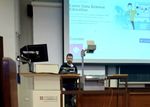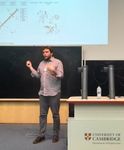NOTES FROM BIGDAT2019 WINTER SCHOOL, CAMBRIDGE JAN 7-11TH 2019
←
→
Page content transcription
If your browser does not render page correctly, please read the page content below
Notes from BigDat2019 Winter School, Cambridge Jan 7-11th 2019
Jyrki Savolainen post-doc researcher at LUT
The development of data science and its
methodologies are in the center of future’s lean,
automation-driven, manufacturing paradigm referred
to as “Manufacturing 4.0”. Tangible, production
facility investments usually have a planned
lifetime of at least 20 years giving you time to adapt
with the technology whereas the life of data science
technologies is usually a lot less.
For example, on-premises database solutions are still
in a steady shift towards cloud computing and produc-
tion critical is increasingly sold as a service instead of BigDat2019 Winter School was held at University of Cambridge Jan 7-11th
“fixed” licenses. This change is ongoing whether your
ICT-department personnel (with their degrees dated
in the 1990s) like it or not. Personally, I find it hard to keep myself updated on the lat-
est developments of data science. To ease my life a bit I
attended BigDat2019 winter school, where top researchers
from different branches of data science shared their
thoughts in a five-day lecture-marathon1. In my mind, the
vast (freely available) online material does not resolve the
problem of staying up-to-date. Simply, you just don’t have
time to search for “the good stuff” (your data pre-processing
phase) and studying it thoroughly (data analysis). Even if you
would manage to do these aforementioned steps, there’s
little if any guidance provided on whether you should predic-
tively start to change your current ways of doing things (your
data insights). Therefore, in this post I want to share my
picks of the BigDat2019 winter school program and synthe-
tize them into more general insights that hopefully are of
interest for both the experts and nonprofessionals.
Richard Bonneau from New York University lecturing on:
Large Scale Machine Learning Methods for Integrating Protein
Sequence and Structure to Predict Gene Function.
More about MFG 4.0 ProjectNotes from BigDat2019 Winter School, Cambridge Jan 7-11th 2019
Jyrki Savolainen post-doc researcher at LUT
A keynote speech was given by Microsoft’s Kenji
Takeda. Taking out the marketing part of it, he high-
lighted the complexity of real world versus the general
perception of data science where sample, highly re-
fined, datasets are downloaded from online coding
competition platforms – such as Kaggle or Codalab –
and then analyzed with ready-made pieces of code. On
the contrary, the major part of the data scientist work
still lies in the problem formulation and/or data pre-
processing.
According to Andrey Ustyuzhanin, the power of data
science competitions is the idea that a large problem
can be divided into small pieces in a way that solving
them does not require domain knowledge of the indus-
try concerned.
Kenji Takeda, Director, Health and AI Partnerships, Microsoft Re-
search:
For example, you were not required to have
a physicist degree when taking part in the
Higgs Boson Machine Learning Challenge2.
So, do not sweat if you don’t have the top-
notch skills on algorithm optimization and
testing (yet?), the effective use of
crowdsourcing may leave the dirty work of
algorithm testing and optimization for the
masses rather than make you unemployed.
Andrey Ustyuzhanin from National Research University Higher School of Economics:
Challenge-driven Data Science: Cracking Domain Problems by Crowd Intelligence
More about MFG 4.0 ProjectNotes from BigDat2019 Winter School, Cambridge Jan 7-11th 2019
Jyrki Savolainen post-doc researcher at LUT
Data mining is a commonly used term, which in everyday language, refers to extracting meaningful insights from datasets
(using statistical methods). Well, here’s a new word: process mining. According to Will van der Aalst, process mining focuses
in the analysis of business processes with the methods of data mining. If you want, you can regard it as a buzzword as this is
what data analysts do already. Anyhow, in process mining, we are interested of chained discrete events, for example, person
buying a concert ticket from an online store (event A) that is followed by receiving payment by invoice (B) or credit card (C)
and ending in a successful delivery (D) or some other (unwanted) end-point (E, F,…). The recorded processes are therefore in
form of combinations “ABCD”, “ACDF”, “ABF”, etc. Interestingly, this type of analysis usually reveals something that should
The point here, highlighted by van der Aalst, is that before getting your
“super-boosted-random-rainforest” -algorithm running, check out what
is really happening from the event data. There is a possibility that first
having a clear view at your underlying business process (with devia-
tions) may be actually the most valuable insight, which obsoletes any
further analytics. To my surprise, the software available is simple to use
and I strongly recommend to give one of them a test drive using provid-
ed tutorials3. Then you can make an informed decision whether it is
any good for your analysis purposes.
Wil van der Aalst from RWTH Aachen University
Lastly, one technical note, as a wake-up call for the company represent- Process Mining: Data Science in Action
atives. Kaggle, Microsoft Azure, Amazon Web Services (among others)
provide free Jupyter Notebook (or equivalent) interfaces to use R and This is a huge benefit for those interested doing
Python for programming online. This means that instead of building some testing on data analytics, but not yet will-
your on-premises computing capacity and maintaining the software, ing to invest in the long-term solutions. I think
you can directly access the latest development tools online running on most of the companies are still in this wait-and-
state-of-the-art machines4. see -phase when it comes to implementing
some serious data analytics – especially in the
SME-sector. For these people, I suggest going
1
For full program see: http://bigdat2019.irdta.eu/ (link tested on 12th Jan online and start tweaking with your data!
2019)
2
https://www.kaggle.com/c/higgs-boson
3
ProM: http://www.promtools.org/
4
For example https://www.kaggle.com/kernels (needs registration)
More about MFG 4.0 ProjectYou can also read

























































